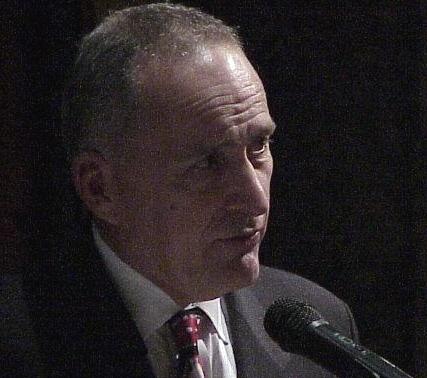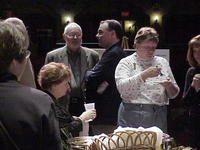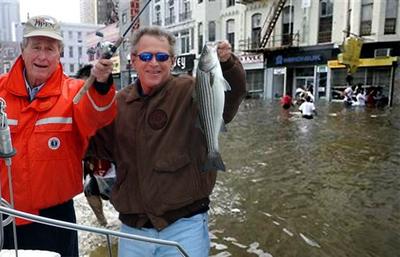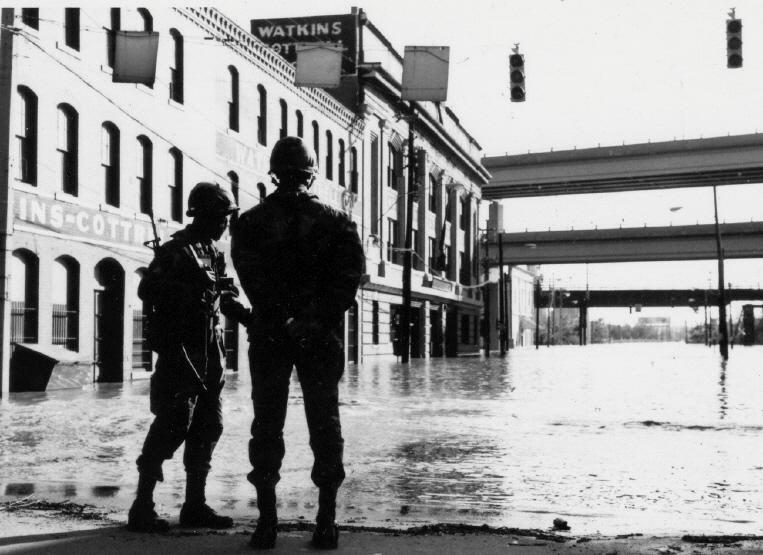
by F. T. Rea
It took almost four whole years for a disaster of sufficient impact to befall the United States that the national psyche could, at long last, allow for the turning of the page on 9/11.
Obviously, there's a big psychological difference between a four-pronged terror attack that kills thousands and violent forces of nature that do the same. Yet the nightmare for those unlucky enough to be in the wrong place at the worst of times can be much the same. The collective sense of helplessness -- rampant anxiety -- felt by all Americans, for some time after such catastrophes, has similarities, too.
Still, as a byproduct of this most recent calamity, Americans should gain some perspective on past calamities. Which ought to lead to seeing 9/11’s place in time more clearly -- tragic and stunning as it was, 9/11 was not the most significant political event in the last 100 years of world history; it was not even the most deadly single day in American history. Turning the page doesn’t mean forgetting, or downgrading what happened in New York, Pennsylvania and Virginia on September 11, 2001; it does mean shaking off the hype and moving on.
The skittish among us need to stop looking at everything that happens through a terror alert, color-coded prism of fear. It also means it's high time for the lapdog national media to bark at the Bush administration whenever it overuses purple images of 9/11 to cover its assorted miscalculations. As well, turning the page means taking a fresh look at the so-called “lessons of 9/11,” a phrase frequently employed by President Bush and his spinners.
Remember how we were told to watch out for crazed Arabs flying crop dusters spewing toxic chemicals? When George W. Bush rolled up his sleeves to unilaterally declare war on what he called “the turr’ists,” remember how he said they hated us for our freedom. So much so they would be only too happy to poison our water supplies, blow up our power stations, start forest fires, etc. They would likely be doing anything in the way of low-budget mischief available to them to cripple our economy and shake our confidence.
Well, it hasn’t happened. Why?
Should we believe it’s because our Homeland Security department has cracked down and prevented such occurrences?
Ha! That’s rich. Homeland Security begins to sound like an oxymoron when ones considers that department's asleep-at-the-switch hurricane relief program for New Orleans. Moreover, just about anyone who has wanted to sneak into this country from Mexico has been able to do so on Bush’s entire watch. Sleeves up or down, the prez seems to shrug off illegal immigration.
So our federal government hasn't really stopped anyone who wanted to wreak havoc from being in our midst. If Bush’s original reading of what message was implied by the 9/11 attacks was right, then why hasn’t sabotage broken out coast-to-coast?
Actually, the only mischief that has fit with Bush’s slasher movie scenario was the anthrax-in-the-mail mystery in the weeks following 9/11, which apparently had nothing to do with the Middle East. Speaking of Homeland Security, the spectacular anthrax case remains unsolved by its sleuth division.
Another of Bush’s Lessons of 9/11 had him supposedly believing that launching an elective war in Iraq would facilitate fighting the worldwide network of terrorists “over there,” rather than "here." Like, he was going to wake up all the sleeper cells, sleeping wherever, and trick them into going to Iraq. Yet, the majority of the hijackers were not from Iraq. They were from Saudi Arabia, as is Osama bin Laden.
It says here that the explosions of 9/11 likely had more to do with Saudi Arabia than Iraq, or even religion gone wrong. Al Qaeda has repeatedly claimed it is extremely unhappy with America’s presence on sacred Saudi soil, and with its unwavering support of the royal family. Murders who deserve no pity, yes, but I still believe they mean what they’ve said.
That said, as the shadows of 9/11 lengthen, the more it appears al Qaeda’s point with 9/11 was always rather blunt: “Get the hell out of our country!”
However, this piece is not demanding an immediate change in the USA’s policy toward Saudi Arabia, a policy which has helped to keep oil plentiful and relatively inexpensive for over 50 years. That, while a blind eye was turned on how the royals treated their people. My point is not that America is right or wrong to continue protecting a heavy handed monarchy from its angry subjects in the 21st century.
My point is this: As long as our government stays in bed with the Saudi rulers that oil-driven policy will have its price. Meaning Americans should not be surprised to hear from al Qaeda's messengers of death, from time to time, no matter what our Keystone Kops department of Homeland Security spends to prevent them.
If we left the royal family to fend for itself -- heavens-to-Betsy! -- wouldn't that be caving in to terrorism? Isn't that wrong?
When the French finally left Algeria in 1962, they were surely not wrong, but there had to have been plenty of hardliners wearing suits in Paris saying to the very end of that bloody occupation that France should never cave in to terrorism.
Meanwhile, for those fiscal hardliners in this country who like to waggle accusing fingers at government, saying that all governments should be starved, so they can’t waste tax dollars, take a good look at what’s happened in New Orleans. Then look at gasoline prices. Anarchy isn’t so pretty, and neither is unfettered capitalism.
As the mud dries in New Orleans, and the toll of Katrina’s wrath is better understood, will the support for Bush’s adventure in Iraq dry up inside the Beltway, too?
-- 30 --
Illustration by F. T. Rea













